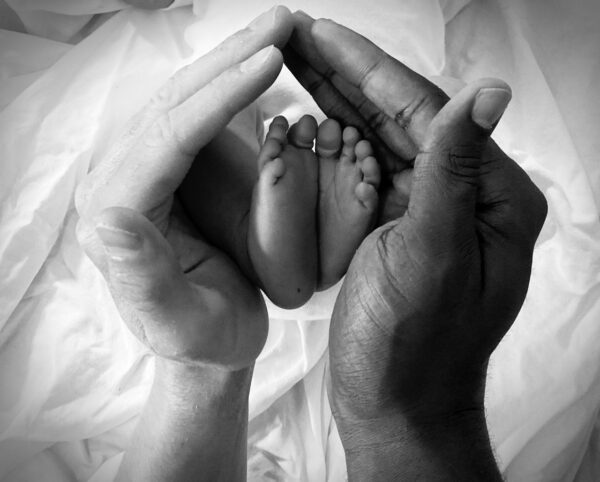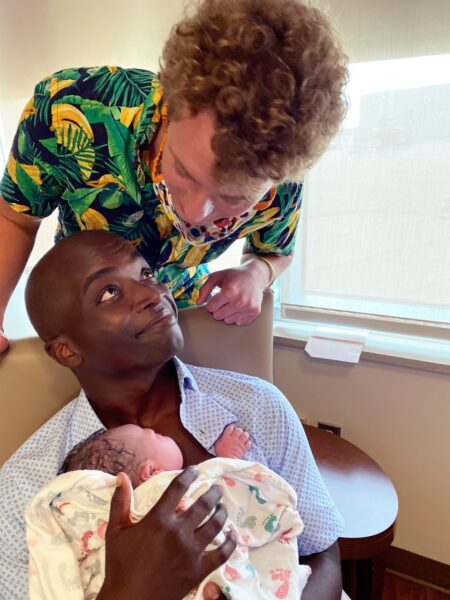A gestational carrier (GC) is a female who has volunteered to carry a pregnancy for someone else.
The GC is not biologically or genetically related to the baby she is carrying. She is simply providing a nurturing environment, in the form of her uterus, for the baby to grow during the gestational period.
If a family member or friend is not acting as your GC, you will need to use an agency or an attorney that screens and facilitates finding a gestational carrier. It is strongly advised that all intended fathers consult an attorney before proceeding.
Fertility Specialists of Texas works with experienced and reputable agencies and attorneys to locate prospective carriers. You and the prospective carrier will meet in order to decide if you can work together. A legal and binding contract will be created at that time by an attorney that specializes in reproductive law. On average, it can take 2-6 months to be matched with a GC.
All parties must seek legal counsel, even if a friend or family member is the gestational carrier.
Screening for Health Issues
The gestational carrier must be free of communicable diseases. Testing is mandatory. The GC is tested for various sexually transmitted diseases including CMV, hepatitis B, hepatitis C, HIV-1, HIV-2, syphilis, herpes simplex virus and toxoplasmosis.
Under the guidelines of the American Society for Reproductive Medicine (ASRM), the GC must also have a psychological evaluation and a written psychological screening. She will be required to have a physician evaluation, uterine evaluations and must be in excellent physical health.
As a gestational carrier, she must not smoke, drink alcohol or use illegal drugs. She must also have a current, normal pap smear. If your GC has a partner, he or she must also consent to an infectious disease screening and psychological screening.
Preparation for the Gestational Carrier
If you and your partner opt for a fresh embryo transfer instead of frozen, then both the gestational carrier’s cycle and the egg donor’s cycle must be synchronized. The retrieval and the transfer will be performed at our Plano / Frisco, Texas IVF center.
While the egg donor is undergoing the retrieval portion of the IVF cycle, the gestational carrier will be given estrogen and progesterone using intramuscular injections. The estrogen and progesterone will prepare her uterine lining for implantation of the embryo. Prior to starting her injections, the physician will ensure the GC has a thin lining and cyst-free ovaries via a transvaginal ultrasound. If everything looks normal, she will start the estrogen. Approximately two weeks later, she will have another transvaginal ultrasound and blood work to make sure the lining is developing adequately. If all is well, the GC will start the progesterone when instructed by her nurse.
The Gestational Carrier IVF Cycle
A frozen specimen, collected from you or your partner, is thawed and one sperm is injected into each mature egg, utilizing a procedure called ICSI (intracytoplasmic sperm injection). On average, 70% of the eggs will fertilize and become embryos. The embryos mature in the LGBT Fertility lab, and a specific number of embryos (dependent upon embryo quality and age of the egg donor) are transferred into your GC. While the goal of every pregnancy is one baby per pregnancy, you and your GC may decide to transfer one embryo from each partner. We usually advise against this, as twin or higher-order multiples present an increased risk to the gestational carrier and the babies.
Approximately 10-14 days following transfer, a blood test called a quantitative bhCG is performed. A bhcg level of 50 or higher is the goal. This test is repeated several times at various intervals to ensure that it is rising appropriately. The initial pregnancy scan is scheduled between 6 and 7 weeks. The ultrasound is repeated at various time intervals. Once we determine that the pregnancy is doing well (typically at the 8-week visit), your gestational carrier is released to her obstetrician for the duration of her pregnancy.



